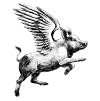
Born on the Cusp of the Pig
A Boomer Remembers
Will de Kypia, 1947-????
I was born at the end of
the first half of the final century
of the previous millennium.
My grade school was Catholic
and the teachers were nuns
who still wore wimples.
Students wore uniforms.
For the girls, a red plaid pleated
jumper, a white blouse, and
a red seamed beanie.
For guys, a light blue dress shirt,
a navy blue tie, long pants
cuffed and belted.
We went off to school like the
seven dwarfs marching to their mine,
skipped back home like prisoners
escaped from their cells.
After school we tussled with our
siblings, played with our pals.
Everyone did chores and homework,
watched TV, wondered what they
would eventually grow up to be.
~
Something was always happening around town.
Boys riding bikes tossed the latest news
onto the smiling porches of neighbors.
Teenagers in T-shirts mowed lawns or worked on cars.
Believers in black went door to door saving souls.
A roving knife sharpener trundled his grindstone on
its wheeled tripod, calling out the old-time street cry
“Any knives or scissors, scissors or knives?”
Avon ladies and the Fuller Brush guy sold cosmetics
and cleaning supplies for the modern housewife.
Tradesmen delivered spotless laundry, perfectly
pressed. They bore Grade A milk, fresh eggs, and
wholesome bread right to your unlocked door.
On hot summer nights the Good Humor man
came by in his truck full of ice cream treats.
We had the same postman for years. He brought
us seed packets in the spring, a Christmas toy
catalog in the fall, everyone knew his name.
Mom bought clothes from ‘Roebuck & Sears.’
”We’ll look great for almost nothing” she'd boast.
“Might wear those pants when I’m dead” Dad once said.
Sure enough, when the old man finally died he did.
We mailed a cereal box top to Quaker Oats and
they sent us the deed for a square inch of gold rush
land in Sergeant Preston’s Yukon Territory.
I hoped to put a Monopoly house on the teensy lot.
So many kids back then, you didn't
need a playdate to organize a game.
Depending on what season it was, you'd grab
bat, ball, and mitt/the pigskin/a puck and a stick,
meet at the regular ball field/park/frozen pond,
choose up sides, shout "Game time!" and begin.
No parents/coaches/batteries required.
We played basketball sometimes, soccer
never, and no one knew what a frisbee was.
That small town had a downtown where we’d
go to shop, to meet friends, to have fun.
Downtown meant the post office, three
churches and a synagogue. The grocery store,
the drug store, the bookstore, and the diner.
Savings bank, a Karmelkorn and a Kresge’s.
A movie theater, just one screen.
A gas station, only two pumps.
Our sole fancy restaurant, whose white
tablecloths and leather-bound menus made it
suitable for celebrating special occasions.
The community recreation center contained
a craft room, a music room, and a game room that
offered ping-pong, puzzles, and board games.
Right next door, the public library.
“We’ll be studying at the libe tonight”
meant we’d be flirting with girls.
The bowling alley was the place grownups
went to bowl, drink beer, smoke cigarettes, and
listen to the jukebox play its parade of hits.
For a quarter they got three
songs or one pack of cigarettes.
Across the street stood the train station. You
could take a train into the city which had a big
downtown. There were department stores,
hotels and hospitals, museums and a zoo.
Though the city had some nice parts, it
had some bad parts too, it had a few
where grownups were scared to be.
Those were the places all
us kids wanted to see.
The city also had an airport,
an international airport.
Flights to those faraway places with
strange sounding names called to me.
~
A bountiful world held countless futures,
each of them splendid and all of them ours.
Someday we'd have to choose one but we were
in no hurry because we expected to live forever.

